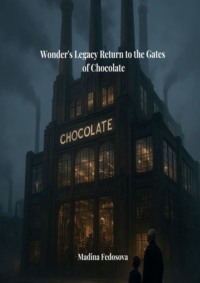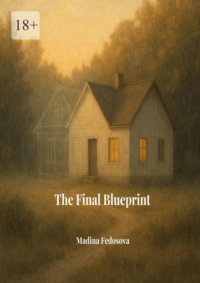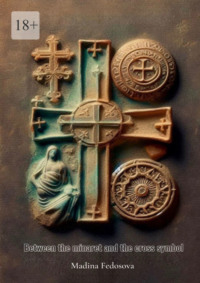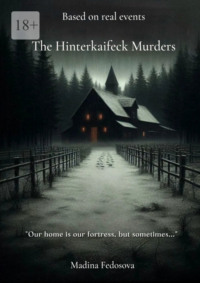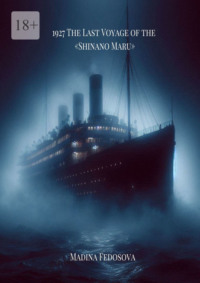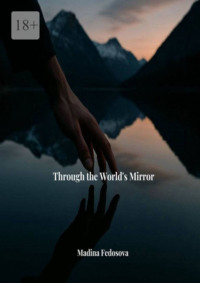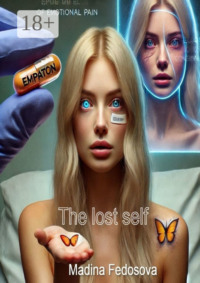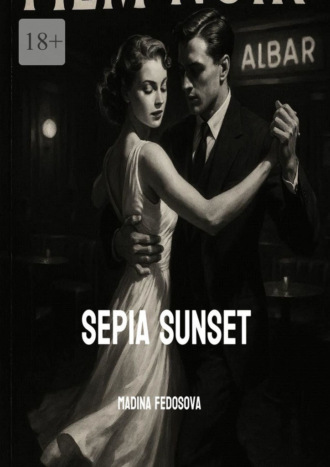
Полная версия
Sepia sunset

Sepia sunset
Madina Fedosova
© Madina Fedosova, 2025
ISBN 978-5-0068-1774-6
Created with Ridero smart publishing system
Author’s Preface
The first time I heard the phrase «sepia sunset,» it stuck in my mind. There was something in that play of words – fading beauty filtered through the lens of time and memory – that I found incredibly moving. It was like a memory of a love that was lost, but not forgotten.
Thus, the idea for this book was born.
Sepia Sunset is the story of Edith and Arthur, a couple who spent almost six decades together. Sixty years is a lifetime, filled with joy, sorrow, compromise, and, of course, love. But what happens when love, like an old photograph, fades and becomes cracked with the patina of mutual resentment? Can it be restored?
This story is not merely a fantasy about time travel. It is an exploration of human relationships, of how easy it is to lose one another in the daily grind and how difficult, yet possible, it is to reconnect. It is a reflection on the power of art to heal and recover what was lost.
While working on this book, I thought a lot about my own relationships, my parents, and all the couples I have met along the way. Every love story is unique, yet they all face common challenges: misunderstanding, disappointment, fear.
I hope that Sepia Sunset will make you think about your own love story, about the moments you cherish, and those that might need healing.
After all, it is never too late to rewrite your story, even when all seems lost.
Sincerely,
Madina Fedosova
Introduction
Resentment hung in the air, thick and cloying, like the stale smoke in a rundown bar. In the small, cluttered living room, where every piece of furniture seemed to hold the imprint of their shared life, another fire was slowly but surely igniting.
Edith, her face a roadmap of wrinkles etched by life’s storms, stood by the window, mesmerized, staring out at a dreary row of identical houses dissolving in the gray autumn drizzle. Rain drummed against the glass, echoing the melancholy tune playing in her soul.
In her eyes, usually so lively and sparkling, swirled a despair seasoned with the bitterness of years of disappointment. Dreams once bright and bold now seemed like a distant, unattainable fantasy.
She had wanted to be a director, to make films, to tell stories, but life – as always – had other plans. And now she was here, in this small, dismal suburb, living out her days, knitting endless scarves and drowning in memories of what might have been.
Arthur, slumped in his favorite, worn-out armchair, resembled an old, threadbare teddy bear that had lost its charm. His gray hair had thinned, revealing a shiny bald spot. His hands, once strong and confident, now trembled, struggling to hold the TV remote.
He avoided Edith’s gaze, fixing his eyes on the flickering screen as if salvation from the oppressive silence dividing them could be found there, amidst the endless stream of news, talk shows, and intrusive commercials.
A silence that screamed louder than any words, drowning out even the TV’s blare.
He knew he was at fault. He knew he had shattered her dream, mocking her passion for cinema and making her feel inadequate. But admitting it was beyond him. Pride, his eternal companion, wouldn’t allow him to apologize.
Fifty-seven years. Fifty-seven years that had turned into a long, exhausting war with no victors, only losers mired in a swamp of mutual reproaches and unspoken regrets.
Every day was like the last: morning coffee brewed in silence, a meager lunch eaten in front of the television, and separate beds in a bedroom where love had once reigned.
Today promised nothing different, until Arthur, suddenly, acted on an impulse born more of desperation than anger.
He rose from his chair, walked over to the old cabinet in the corner of the room, and opened its creaky door.
Inside, among dusty boxes and old belongings, lay it – Edith’s old movie camera, the symbol of her unfulfilled dream.
And Arthur, with a sudden, inexplicable fury, grabbed it and headed for the trash can.
Edith flinched as if struck. She turned slowly, and her eyes flashed with anger mixed with pain. «What are you doing?» she hissed like a snake.
Arthur remained silent, his face contorted in a grimace of rage and shame. He tightened his grip on the camera, as if afraid he might change his mind.
He thought that by getting rid of this old thing, he was also ridding himself of the burden of the past, of the reproaches Edith never voiced but which he constantly felt.
He wanted to erase the memory of her disappointment, her shattered dreams, everything he believed he had failed to give her. Foolish, of course. But at that moment, it seemed like the only way out.
«You wouldn’t dare!» Edith screamed, rushing at him. She tried to wrench the camera from his hands, but Arthur pushed her away, misjudging his strength. Edith staggered and fell to the floor, hitting her head on the corner of the coffee table. Darkness clouded her vision.
Arthur froze in horror. «Edith!» he rasped, rushing to her aid. He dropped to his knees beside her, trying to revive her. But Edith lay motionless. Her face was pale, and a crimson stain slowly spread on her temple.
At that moment, as if in response to his despair, the room began to flicker. The walls wavered, colors dimmed, and the world around them dissolved into pixels. Arthur felt dizzy, nauseous. It was as if he were falling into a black hole.
And then everything vanished.
When his sight returned, Arthur gasped for air as if emerging from icy water. The dreary living room with its musty smell and faded wallpaper was gone, like a bad dream. Under his feet was wet cobblestone, not a worn-out carpet. He stood in the middle of an unfamiliar street, lashed by rain that stung his cheeks with icy needles.
Around him rose majestic Art Deco buildings, as if stepped out of an album on the golden age of architecture. Arthur remembered reading about them: the strict geometric forms, the rich ornamentation, the pursuit of luxury and elegance. Seeing them in person was staggering. Like vintage toys, cars from the 1930s – Packards, Cadillacs, Duesenbergs – rolled down the wet pavement, their headlights glinting in the rain puddles.
People dressed in elegant suits and hats hurried about their business, urging each other on with phrases straight out of an old movie. «Hurry up, Mr. Johnson, tickets for The Maltese Falcon are selling out!» «Madam, your corset is divine, but I fear you’re late for your meeting with Mr. Capone!» Arthur was utterly bewildered. Where was he? What had happened? Had he lost his mind? Or was this some kind of insane prank?
But most importantly – where was Edith? His heart hammered wildly, skipping beats. Was he delirious? Was this «reality» only in his mind? He was afraid to look back, afraid his worst fears would be confirmed.
But he turned and saw her, standing beside him, looking around in confusion. On her face, usually etched with wrinkles like a map of their lived years, was an expression of astonishment and fear. The wrinkles were still there, but the expression… It was something new, something long forgotten. And most astonishing of all – there was no trace of the blow on her head. No bruise, no scratch, nothing. As if that terrible scene in the living room had never happened. As if time had turned back.
«Arthur, what is this?» she whispered, grabbing his arm with such force that his bones ached. Usually, her touch was soft, cautious, as if she were afraid to cause pain, but now… «Where are we? What’s happening? Is this a dream? If it is, I want to wake up!» The genuine terror in her eyes made Arthur flinch involuntarily. She was afraid not only of the unknown, but that he, Arthur, was somehow responsible for this madness. «My God, Arthur, what have you done?»
Chapter 1
A City in Sepia Tones
The rain, Chicago’s eternal companion, lashed the pavement with such force it seemed an angry celestial plumber was determined to flush the entire city of its sins. Droplets hit the sidewalk, splattering like tiny exploding grenades.
Neon signs reflected in the wet asphalt, creating a bizarre play of light and shadow that reminded Arthur of frames from old film noirs – The Maltese Falcon, Double Indemnity, The Big Sleep. I wonder if real gangsters lived like this? flashed through his mind. Drank bourbon, hatched schemes, and listened to jazz until someone put a bullet in their head?
He shivered, trying to hide from the biting wind in his old, weathered coat, which seemed to remember the days of his courtship with Edith. Well, at least I never threw this out, he thought, gratefully remembering Edith’s grumbling about «that old rag»: «Arthur, you’ve been wearing it for half a century! It’s time to part with this relic! It probably remembers the dinosaurs!»
And, as if in mockery, the wind carried a snippet of melody from a nearby bar: «I don’t want to set the world on fire, I just want to start a flame in your heart…» Ironic, thought Arthur, how far we are from that now…
He looked around, trying to latch onto something familiar, something that would anchor him back to reality. But everything was alien, as if he had stepped into a museum whose exhibits had come to life.
Majestic Art Deco buildings stood like proud skyscrapers straight from an architecture textbook. They’d fit right in Miami, on Ocean Drive, Arthur thought, they’d be appreciated there.
Vintage automobiles – Cadillacs and Packards with gleaming chrome grilles – rolled down the wet cobblestones with a dignity that suggested they were destined not just for travel, but for history books and style icons. I bet each one has its own story, Arthur thought, a story of love, betrayal, success, and ruin, like in a Fitzgerald novel.
People dressed in elegant suits and hats, as if they’d just stepped out of a jazz club, looked like they’d walked off the cover of Esquire magazine. I wonder if they’ve even heard of jeans? crossed his mind. Probably consider them for laborers and ruffians. Oh, Edith, if you could see this! You’d surely say, «Arthur, everyone here looks like they’ve stepped out of a glossy magazine!»
The whole scene looked like a set for an old movie, a living page of history. And Arthur suddenly understood: «But this is a set… and it seems we’re the stars of this picture.»
«Where are we, Arthur?» Edith whispered, trembling like an aspen leaf caught in a sudden storm. She tightened her grip on his hand, and Arthur felt her fingers, usually cool and dry like autumn leaves, digging desperately into his palm, seeking an anchor.
The sheer terror in her eyes made him recall his grandmother Agafya Timofeevna’s words, known for their sharp wisdom: «Fear, like rust, eats at the soul, and bleak anxiety is worse than any disease.»
He had no answers himself. It had all happened so suddenly, so unreal, he still couldn’t believe it. Only one thought circled in his head: I must be dreaming. This is just a bad dream, like the ones I get after too much smoked sausage. But for some reason, he was afraid to pinch himself. What if it turned out he wasn’t asleep?
Then what? Then he was in a film with no director, and the script was being written by some mad screenwriter?
Suddenly, like angry beasts unleashed from a cage, two men emerged from the dark mouth of an alley. They wore dark, ill-fitting suits, as if borrowed, and felt hats pulled low over their eyes.
Hats, by the way, in those days weren’t just headwear but a kind of calling card, a sign of belonging to a certain circle. Though which one, in this case, Arthur preferred not to find out, remembering the saying: «Let sleeping dogs lie.»
They were shouting fiercely at each other in a coarse, guttural dialect, a mix of Polish and Italian, waving their arms as if conducting an invisible orchestra playing a funeral march.
In one man’s hand, a short-barreled revolver glinted like a sinister spark in the night – a Colt or a Smith & Wesson; Arthur was no firearms expert, but he’d seen them often enough in movies, especially ones with Humphrey Bogart.
Statistically, Chicago in the 40s had more guns per capita than anywhere else on the American continent. Rumors said even the mail carriers carried a pistol, just in case.
So much for the «City of the Big Shoulders,» Arthur thought with grim irony, quoting Carl Sandburg, more like the «City of the Big Bullets.»
Arthur and Edith, like a pair of frightened rabbits, froze in place, paralyzed with a terror as if they’d been doused with ice water. They had never seen anything like it, not in their quiet, suburban life where the biggest crime was a parking violation, nor even on television.
This wasn’t like a reality show; it was a living page from the crime chronicles, a newspaper headline like «Chicago in Flames Again! Gangland Shootout on the North Side!» where every frame was saturated with the smell of gunpowder, spilled whiskey, and the fear of death.
In that moment, Arthur suddenly understood what real fear was, not just the mild anxiety before a doctor’s appointment or watching the evening news full of alarming reports about the war in Korea. This was a fear that paralyzed movement, stole your voice, and made your heart pound in your chest like a trapped bird desperately trying to escape. And Arthur thought: So this is what real hell is like. Not fire and brimstone, but this soul-freezing terror that makes you want to curl up in a corner and never come out.
«Oh, my God,» Edith whispered soundlessly, gripping Arthur’s arm so hard he felt her bones crunch.
Her eyes reflected pure panic, mixed with a strange, morbid curiosity.
«Is this all real? Are we really in a movie?»
She had always dreamed of being on a film set, of seeing how movies were made, but it seemed reality was far more terrifying and dangerous than she could have imagined.
And I always said movies were my life, she thought with bitter irony.
They turned a corner, hoping they had shaken their pursuers, though Arthur, frankly, already felt his lungs were about to burst and his knees were buckling. Not as young as I used to be for this kind of running, crossed his mind, time for calm walks with a cane. And then, as if by cruel fate, just a few meters away, they ran headlong into a man standing leisurely by the entrance to a dimly lit club, from which muted jazz sounds drifted. Clubs back then, by the way, weren’t just places of entertainment but a kind of «neutral territory,» where members of different factions could meet, make deals, and settle their problems.
The man was dressed in an impeccable, perfectly tailored three-piece suit that was undoubtedly made by the best tailor in town. On his head sat an elegant fedora, tilted jauntily to one side as if he’d just stepped off the cover of Esquire. He was smoking a cigarette, blowing a thin stream of smoke into the rainy air, and looking at them with a contemptuous, sidelong glance, as if appraising zoo exhibits. His gaze held a mix of boredom, disdain, and a strange, cold curiosity.
«In a hurry, night owls?» he asked, his voice soft, almost velvety, but with a steely firmness and threat beneath, as if he were ready to bare his claws at any moment. «What’s the matter, having a disagreement on the night streets of Chicago?» His voice held a light mockery, as if he were privy to everything happening in this city. «Sorry, we just…» Arthur tried to explain, breathless from running and nerves. But the man interrupted him, raising a hand in an elegant suede glove.
«Quiet, quiet,» he said, shaking his head. «No need to get so worked up. In this city, it’s best not to attract unnecessary attention. Especially if you’re not from around here. And you, I see, are clearly not local.» He gave them a contemptuous once-over, scanning them from head to toe. «What brings you to this city, and, most importantly, what do you need here?»
«Sorry, we just… got lost,» Arthur stammered, feeling his voice betray him with a tremble. He had never been a good liar, and now, when his life depended on it (or so it seemed), his words sounded pathetic and unconvincing.
Edith, still gripping his arm so hard he thought he’d be bruised, nodded in agreement, trying to look as innocent as possible. «We’re not from around here. We… came from far away,» he added, trying to justify themselves.
Chaos reigned in Edith’s head. She still couldn’t believe this was happening to them. Somehow, they had ended up in the heart of gangster Chicago, a city she had only read about in books and seen in movies. Fragments of memories, images from old films she loved so much, flashed through her mind like a kaleidoscope: chases, shootouts, fatal beauties in shimmering dresses… My God, what are we doing here? raced through her head. She remembered a line from Casablanca: «We’ll always have Paris.» But where was Paris here?
The man raised an eyebrow almost imperceptibly, as if he’d heard the funniest joke in his life. His lips curved into a slight, contemptuous smile that, Arthur thought, could freeze even the most hardened thug. «Came from far away, you say? To Chicago? In the middle of the Great Depression?» He shook his head. «This city isn’t for tourists, Mr… eh… and Mrs.?» He looked at them questioningly, expecting an answer. His voice held a light mockery. «Especially since you look like you’ve just been spat out by the alley.» He blew a thin stream of smoke, examining them from head to toe as if appraising goods at a market. «This city doesn’t like tourists, especially those who show up at this time and under these circumstances. There are plenty here looking to make a living not entirely honestly. And you, by the looks of it, have attracted someone’s attention. And, if I’m not mistaken, you’re in serious trouble.»
At that moment, Arthur recalled a quote from some crime novel: «You can live in Chicago for ten years and then wonder how you’re still alive.»
Arthur felt his heart pound wildly. Did he understand? Did he know what had happened? «We… we didn’t do anything,» Arthur hastily objected. «We were just walking…»
The man laughed, short and dry, like a gunshot. «Walking? In this neighborhood? At this hour? In such company?» He took a step closer, and Arthur caught the scent of his cologne. It was a sharp, heavy smell that, he thought, reeked of death and vice. «I don’t know how you were ’walking,» but you’re in serious trouble now, and I advise you to be careful.» His gaze became even more intense, as if trying to look right into their souls, to understand who they really were. «And, if I’m not mistaken, you’re in dire need of help.»
At that moment, from the alley they had just fled, came the sound of rough voices and footsteps, growing louder and louder. Arthur cursed under his breath. Damn it! This is what our ’walk’ got us! he thought, realizing they had almost no time left.
The man, hearing the noise, instantly changed. His contemptuous expression turned wary, and a fire ignited in his eyes that made Arthur shudder involuntarily. He quickly glanced at them, assessing the situation in seconds, then, as if making a decision, said with firmness in his voice: «Seems you’ve got trouble. And I have a proposition you’ll find hard to refuse…» He leaned closer, lowering his voice: «If you want to save your skins, you’d better follow me.» He pulled a gold watch from his pocket, glanced at it quickly, and added: «Time’s running out.»
Edith looked at Arthur, and the fear in her eyes made him uneasy. It was a deep, animal fear, as if she sensed something terrible. He saw his own fears, his own confusion and despair reflected in her eyes. What do we do? her eyes seemed to scream. Trust this stranger, who, judging by his clothes and manners, was connected to this dangerous world, or try to escape on their own, with no idea how?
Scenes from The Maltese Falcon flashed before her eyes, where the characters were constantly drawn into intrigues and betrayals. She had always loved that film, but now there was no room for romance. The voices were getting closer, the footsteps louder. She had no time to think. She felt Arthur squeeze her hand, and that contact, like an electric shock, brought her back to reality. She knew that Arthur, despite all his grumbling and conservatism, would always be by her side, no matter what.
Arthur, in turn, glanced at Edith, trying to assess her condition. Her face was pale as a sheet, her lips trembling. He understood she was scared to death. His heart was racing, his mind in chaos. He had always been a cautious man, preferring a bird in the hand to two in the bush. But now, with his and Edith’s lives hanging by a thread, he had to make a decision in seconds. What did he even know about this stranger? Maybe he was one of these gangsters himself? Or maybe he genuinely wanted to help?
A quote from some ancient treatise flashed through his mind: «When standing on the edge of an abyss, any step could be your last.» He understood that any choice could be fatal, but inaction was not an option. He had to do something.
He took a deep breath, trying to calm down, and looked into Edith’s eyes. He saw his own determination, his readiness to take a risk, reflected in them. He gave her a barely perceptible nod, letting her know he had made a decision.
«Well,» Arthur replied, addressing the stranger. His voice sounded surprisingly calm, though everything inside him was shaking. «We agree.» He paused for a moment, gathering his courage, then added: «But we want to know where we’re going and what to expect.»
The man smirked, and a strange, almost sinister glint flashed in his eyes. «Oh, believe me, Mr… eh…» – he looked at them questioningly, expecting an answer – «you’re better off not knowing. Ignorance is bliss. Just follow me and don’t ask unnecessary questions. And if you do ask, make sure they’re the right ones.» He gestured for them to follow him. «Time’s running out,» he repeated, glancing at his watch again. The watch, by the way, was gold, with an engraving, and looked very expensive. That watch probably costs more than my entire apartment, Arthur thought.
Without another second’s hesitation, Edith and Arthur, like shadows clinging to the walls, followed the stranger, dissolving into the gloom of the alley. They left behind the city’s noise, the approaching voices, and the impending danger, stepping into an unknown full of secrets and perils.
Chapter 2
In the Embrace of the Night
The alley they turned into was narrow and filthy, as if created specifically for dark deeds. This is where they film the bleakest scenes for noir movies, Edith thought, trying not to look down.
The air was thick with the stifling smell of rot and dampness, mixed with the sharp odor of cheap tobacco – «roll-ups,» which, according to Arthur, all the workers smoked back then.
Dirty water squelched underfoot, reflecting the dim light of rare streetlamps, and Arthur tried his best to avoid puddles, afraid of soaking his old shoes. My feet are always cold as it is, he grumbled to himself.
Edith, walking behind him, held his hand tightly, as if afraid of getting lost in this gloomy maze. She was silent, trying not to breathe too deeply to avoid inhaling the stench. A line from some old poem echoed in her head: «A city of sin and vice.»
The stranger, walking confidently ahead as if he owned the place, didn’t even glance back. He walked fast, almost running, as if being chased. From time to time, he cast short, wary glances around, as if fearing they were being watched not only by the gangsters but by some other, even more dangerous forces. His confidence was both frightening and inspiring hope. I wonder who he is? thought Edith. She recalled a newspaper article she’d read years ago: «In Chicago, every third person is a former gangster.»
They walked in tense silence, only the sound of their footsteps and the steady drip of rain from the roofs disturbing the quiet of the night city. Arthur tried to get a better look at their guide’s face, but in the semi-darkness of the alley, it was nearly impossible. He only knew the man wore an expensive, custom-tailored suit and smelled of costly cologne. I wonder how much he earns? Arthur thought. He had never been good at making money.


